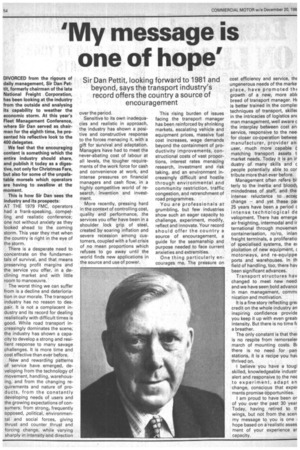'My message is one of hope'
Page 56

If you've noticed an error in this article please click here to report it so we can fix it.
Sir Dan Pettit, looking forward to 1981 and beyond, says the transport industry's record offers the country a source of encouragement
DIVORCED from the rigours of daily management, Sir Dan Pettit, formerly chairman of the late National Freight Corporation, has been looking at the industry from the outside and analysing its capability to weather the economic storm. At this year's Fleet Management Conference, where Sir Dan served as chairman for the eighth time, he presented his reflective look to the 400 delegates.
We feel that the encouraging content is something which the entire industry should share, and publish it today as a digestive, not only for Christmas Fare, but also for some of the unpalatable morsels which operators are having to swallow at the moment.
This is how Sir Dan sees the industry and its prospects: AT THE 1979 FMC, operators had a frank-speaking, compelling and realistic conference; one not without anxiety as they looked ahead to the coming storm. This year they met when the country is right in the eye of the storm.
There is a desperate need to concentrate on the fundamentals of survival, and that means preserving profit margins and the service you offer, in a declining market and with little room to manoeuvre.
The worst thing we can suffer from is a decline and deterioriation in our morale. The transport industry has no reason to despair. It is not a complacent industry and its record for dealing realistically with difficult times is good. While road transport increasingly dominates the scene; the industry has shown a capacity to develop a strong and resilient response to many savage challenges. It is more time and cost effective than ever before.
New and rewarding patterns of service have emerged, developing from the technology of movement, handling, warehousing, and from the changing requirements and nature of products, from the constantly developing needs of users and the growing expectations of consumers; from strong, frequently opposed, political, environmental and social forces, giving thrust and counter thrust and forcing change, while varying sharply in intensity and direction over the period.
Sensitive to its own inadequacies and realistic in approach, the industry has shown a positive and constructive response to the forces menacing it, with a gift for survival and adaptation. Managers have had to meet the never-abating cost of labour at all levels, the tougher requirements of the work force for cash and convenience at work, and intense pressures on financial managers and cash flow, in a highly competitive world of research, invention and investment.
More recently, pressing hard in the context of controlling cost, quality and performance, the services you offer have been in a shoulder lock grip of steel, created by soaring inflation and severe recession among customers, coupled with a fuel crisis of no mean proportions which refuses to go away until the world finds new applications in the source and use of power. This rising burden of issues facing the transport manager has been reinforced by shrinking markets, escalating vehicle and equipment prices, massive fuel cost increases, wage demands beyond the containment of productivity improvements, constructional costs of vast proportions, interest rates menacing research, investment and risk taking, and an environment increasingly difficult and hostile through environmental and community restriction, traffic congestion, and retrenchment of road programmes.
You are professionals at grumbling, but few industries show such an eager capacity to challenge, experiment, modify, reflect and innovate. Your record should offer the country a source of encouragement, a guide for the seamanship and purpose needed to face current anxieties and extremities.
One thing particularly encourages me. The pressure on
cost efficiency and service, thE ungenerous needs of the marke.
place, have promoted tht growth of a new, more ablt breed of transport manager. lit is better trained in the comple) techniques of transport, skillet in the intricacies of logistics ant man management, well aware c the interplay between cost an' service, responsive to the nee for closer co-operation betwee manufacturer, provider an' user, much more capable t matching transport assets t market needs. Today it is an ir dustry of many skills and c people potentially able to car tribute more than ever before.
Management often refers br terly to the inertia and blood\ mindedness of staff, and the intense reluctance to accer change — and yet these pa: 25 years have been a period r intense technological de veloprnent. There has emerge air freighting, intermodal and ir ternational through movemen containerisation, ro/ro, inlan freight terminals, a proliferatio of specialised systems, the e) ploitation of new equipment, c motorways, and re-equippe ports and warehouses. In th field of handling, too, there hay been significant advances.
Transport structures hay changed to meet new need and we have seen bold advancE in man management, commt nication and motivation.
It is a fine story reflecting grei credit on the whole industry an inspiring confidence provide you keep it up with even great( intensity. But there is no time ft a breather.
The only constant is that thei is no respite from rernorsele march of mounting costs. B1 there is no need for pan stations, it is a recipe you ha thrived on.
• 1 believe you have a tougl skilled, knowledgeable industr alert and responsive to the neE to experiment, adapt an change, conscious that expel ments promise opportunities.
I am proud to have been or of you over the past 30 year Today, having retired to tt wings, but not from the seen my message to you is one hope based on a realistic asses ment of your experience ar capacity.




















































































